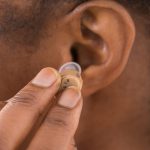 New research from the Centers for Disease Control and Prevention (CDC) shows that hearing loss is an important health issue that can lead to anxiety and depression – it’s also a bigger problem than we realized, and many people are unaware they have it.
New research from the Centers for Disease Control and Prevention (CDC) shows that hearing loss is an important health issue that can lead to anxiety and depression – it’s also a bigger problem than we realized, and many people are unaware they have it.
Using information from the National Health and Nutrition Examination survey, investigators found that a surprising amount of hearing damage comes from within our homes and surrounding community. Noise exposure is the second most common cause of hearing loss after aging, and the cost to care for patients is rising — expected to reach $51 billion by 2030.
Here are some steps to take to protect your hearing:
- Avoid noisy places whenever you can — step away from sound sources and minimize time spent near them.
- Carry ear plugs with you and use them when necessary.
- At home and in the in car — keep volume down, take breaks from listening.
- Talk to your doctor about getting a hearing exam.
One of the most important messages from the CDC study is that people don’t realize they have hearing loss. This is consistent with data just collected at UPMC indicating the majority of older adults tested who did have impactful or significant hearing loss reported that they did not believe they had hearing loss.
The only reliable way to find out if there is hearing loss is to test the hearing with tones. Medicare began covering hearing screening 10 years ago, yet a 2015 study reported that only 23 percent of all adults had their hearing screened during their past physical. In contrast, 74 percent of adults reported that they had their eyes screened at least once every two years, and 63 percent reported that they have their teeth checked annually, which implies an urgency to action that is not found related to the identification of permanent hearing loss. Primary care physicians can have an impact on this by recommending hearing testing for all patients, not just older adults.
Though not discussed by the CDC in the recent study, tinnitus, or ringing in the ear, is a common symptom that comes along with noise-induced hearing loss. For some people, it’s more bothersome than the actual hearing loss, and it’s also permanent. UPMC offers a very successful Tinnitus Treatment Program that helps people cope with and manage the tinnitus.
Our basic science auditory research group is doing exciting work in the area of tinnitus, but your best bet is to protect your hearing, which also will reduce the likelihood that you’ll get tinnitus.
UPMC opened the Musicians’ Hearing Center in 2003. Although the Occupational Safety and Health Administration now regulates many work places — which has had a positive impact on noise-induced hearing loss — it does not regulate all workplaces, including the workplaces of musicians. The center is meant for anyone who needs help protecting their hearing, but the focus is on musicians because those who play in groups such as high school bands, orchestras and symphonies, along with amplified musicians, are all going to get hearing loss if they don’t protect their hearing.
The chance of damage is all about dose — how loud the sound is and how long you are exposed to that sound. If a sound is loud enough, such as a gunshot or a siren, you can have immediate damage. In fact, the levels of sound produced by high school and college bands produce damage after 4 seconds of exposure. This is why we run our High School Band Program, which is now in 37 schools around the Pittsburgh area.
The CDC recommendation that primary care physicians talk to patients about reducing or avoiding noise for health reasons is great. It also is important to understand that sometimes we cannot avoid noise and we then need to have good hearing protection. That is where a place like the Musicians’ Hearing Center comes in. We can meet with individuals and figure out the best sound and best cost solution for their protection needs. For a long time, this was the problem for musicians — hearing protection made their music sound incorrect. Now we have musicians’ earplugs that keep the fidelity of the sound, but make it less loud. This is important for many listeners who still need to hear what is happening around them, but also need the sound level decreased for safety. We can now provide a solution that allows for continued communication while protecting hearing.
For more information about the Musicians’ Hearing Center, call 412-647-2030. For a free hearing screening with tones, call the “Dial-A-Hearing-Screening Test” 412-647-2400.
Dr. Catherine Palmer is the director of the Center for Audiology and Hearing Aids in the Department of Otolaryngology at the UPMC Eye & Ear Institute and an associate professor of Communications Science and Disorders at the University of Pittsburgh’s School of Health and Rehabilitation Sciences.








